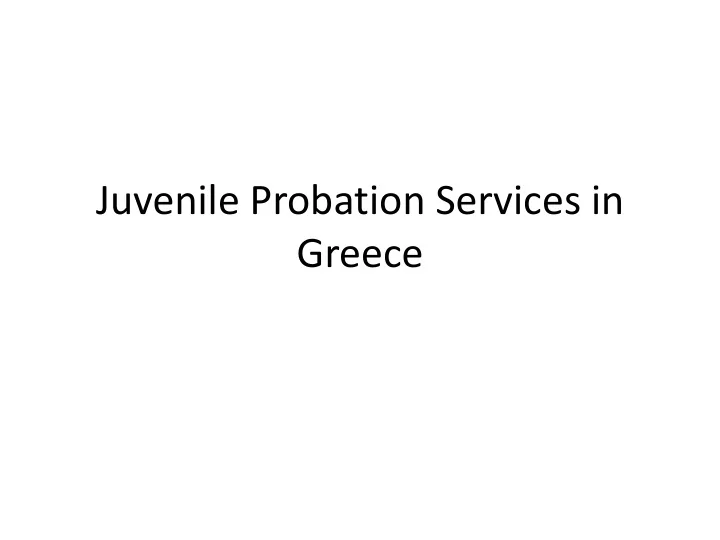

Juvenile Probation Services in Greece
Main points • Mission of the Greek Juvenile Probation Services • Penal treatment of the juvenile in court • Perplexities / challenges of our work
Population of interest to the Service • Juveniles with prosecutable offences committed bet. ages 8 to 18 – actual court trial may take place even after 18 (according to Greek law, penal responsibility begins at age 15) • Juveniles requiring intervention on a prevention level (no known prosecutable offence, possible danger of delinquency, referral by Public Prosecutor for Juveniles)
Mission of the Greek Juvenile Probation Services • Pre-trial : multi-faceted social research, resulting in written report to the judge, presenting personal and family conditions of the minor, case history; probation officer’s recommendation included, regarding treatment of the minor • Post-trial : monitoring implementation of reformatory orders of the Court, extensive counseling as part of specific measures, possible referral to specialised public services (social / health / mental health / educational, etc)
Penal treatment of the juvenile There are three options: • reformatory / educative measures • therapeutic measures • detention in Special Juvenile Prison (for minors over 15) There is always an effort made by the juvenile courts to impose sanctions alternative to imprisonment for minors.
Penal treatment of the juvenile - Reformatory measures 1. Reprimand – warning 2. Responsible supervision by parent(s) or guardian 3. Responsible supervision of foster family 4. Responsible supervision by: i. the Society for the Protection of Minors , or ii. an institution for the education of minors, or iii. a Juvenile Probation Officer
Penal treatment of the juvenile - Reformatory measures (cont/d) 5. Victim – offender mediation (emphasising apology by the juvenile offender) 6. Compensation towards victim or reparation by any other means 7. Community service imposed on minor (measures 5, 6, & 7 fall within a restorative justice framework) 8. Participation of minor in social, educational, mental health or substance abuse rehabilitation programmes
Penal treatment of the juvenile - Reformatory measures (cont/d) 9. Professional or other training 10. Special traffic training programmes 11. Intensive custody/ supervision by an institution or a Juvenile Probation Officer 12. Placement of juvenile in a special educational institution, affiliated with the Ministry of Justice (this measure may be enforced only for boys, as there is only one such public institution, in the city of Volos).
Penal treatment of the juvenile - Therapeutic measures 1. Participation in an open or day-care therapeutic programme 2. Placement in a therapeutic or other adequate closed institution. These measures are ordered after professional diagnosis and advice, by a specialised team consisting of a psychiatrist, a psychologist and a social worker.
Penal treatment of the juvenile – Detention in Special Juvenile Correctional Facility When the Juvenile Court, taking into account the circumstances of the offence and the personality of the juvenile offender, considers that a penal sanction is necessary to deter persons above 15 from re- offending, orders detention in a “Special Juvenile Prison”.
Diversion from prosecution Article 45a - Greek Code of Penal Procedure : If a minor commits a petty offence or a misdemeanour (usually theft, assault, vandalism), the Public Prosecutor may refrain from prosecution, if he/ she considers that adjudication and prosecution are not necessary to prevent the young offender from committing further crimes. Diversion from prosecution may be accompanied by one or more reformatory measures).
Perplexities- Challenges School failure / drop-out: no technical schooling options for • youngsters who have not completed Junior High School. Substance misuse / abuse - motivating the minor and family • to ask for help: adolescent egocentrism, family tolerance, difficulty to commit oneself to attending a drug rehabilitation programme Domestic violence - child maltreatment (physical, sexual, • emotional abuse, and/or neglect): lack of shelters for adolescent delinquents
Perplexities- Challenges (cont’d) Additional challenges : • mental health problems of minor or family • poverty • acculturation difficulties of immigrant families • unaccompanied immigrant minors (without guardian)
Recommend
More recommend